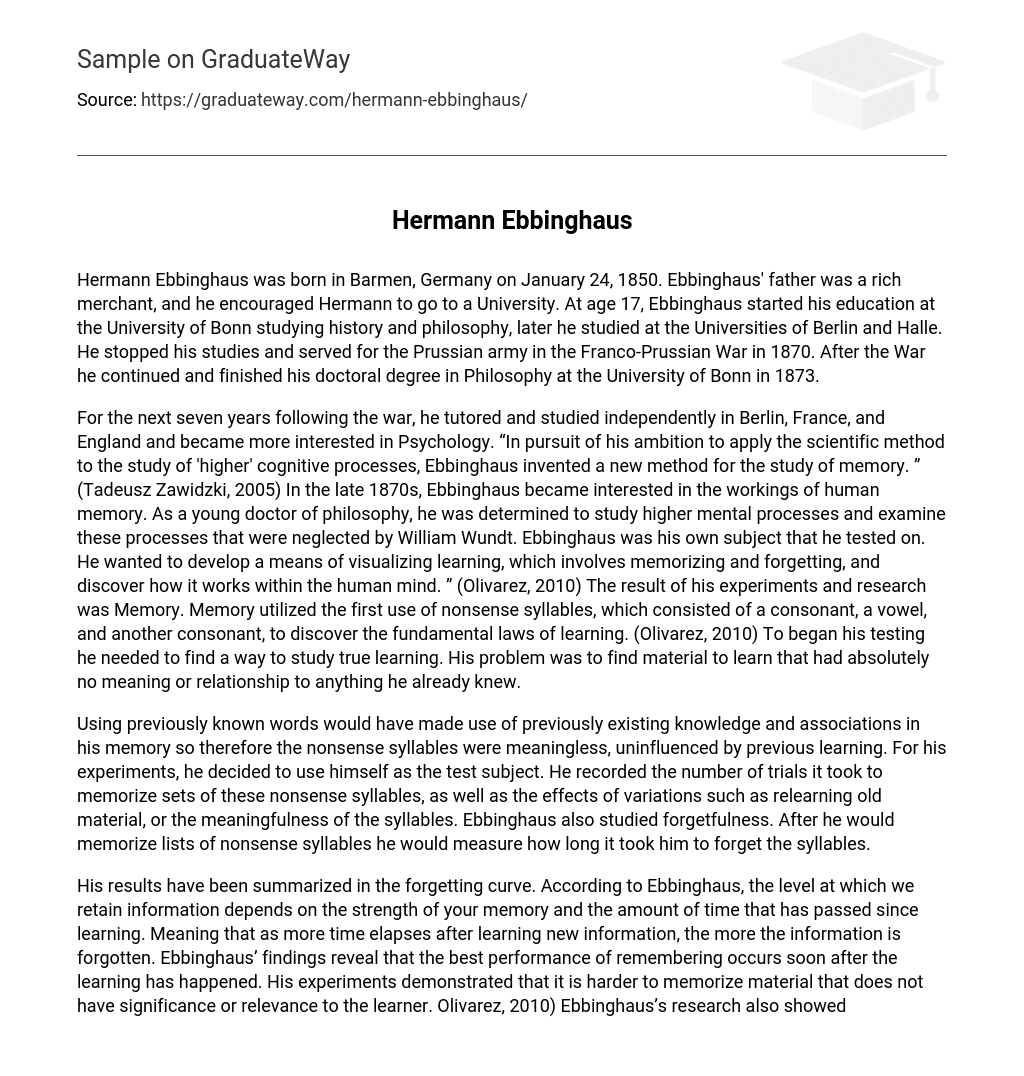Hermann Ebbinghaus, born on January 24, 1850 in Barmen, Germany, began his studies at the University of Bonn when he was 17. He then pursued further education at the Universities of Berlin and Halle before pausing to serve in the Prussian army during the Franco-Prussian War in 1870. After the war, he resumed his studies and obtained a PhD in Philosophy from the University of Bonn in 1873.
Following the war, he dedicated seven years to tutoring and pursuing independent studies in Berlin, France, and England. Throughout this period, his fascination with Psychology intensified. Ebbinghaus devised a fresh approach for examining memory with the objective of employing a scientific method to explore “higher” cognitive abilities (Tadeusz Zawidzki, 2005).
During the late 1870s, Ebbinghaus developed an interest in human memory. As a young philosophy doctor, he focused on studying higher mental processes, particularly those disregarded by William Wundt. Ebbinghaus conducted experiments on himself, aiming to create a method of visualizing learning, including memorization and forgetting, and understanding its mechanisms within the human mind (Olivarez, 2010).
The outcome of his experiments and research was the creation of Memory, which employed the initial implementation of nonsense syllables, comprising a consonant, a vowel, and another consonant, in order to uncover the fundamental principles of learning (Olivarez, 2010). In order to initiate his experimentation, he needed to identify a method to study genuine learning. His challenge involved finding material to learn that possessed no significance or association with any prior knowledge.
By utilizing familiar words, a person can tap into their existing knowledge and associations stored in their memory. This implies that utilizing nonsensical syllables would render them meaningless, as they are not influenced by any prior learning experiences. Ebbinghaus, for his experiments, chose himself as the subject and recorded the number of trials it took for him to remember sets of these nonsensical syllables. He also examined the effects of various factors, such as relearning previously studied material and the meaningfulness of the syllables. Additionally, Ebbinghaus conducted research on forgetfulness by measuring the duration it took for him to forget the syllables after memorizing them.
In the forgetting curve, Ebbinghaus summarizes his results, stating that the level of information retention is influenced by memory strength and time elapsed since learning. This means that as time passes, more information is forgotten. Ebbinghaus’ research indicates that the highest memory performance is achieved shortly after learning. Through his experiments, he also found that it is more difficult to memorize material that lacks importance or relevance to the learner (Olivarez, 2010).
According to Ebbinghaus’s research, the learning curve is influenced by the amount of material to be learned. He found that relearning is easier than initial learning and that forgetting takes longer after each repetition. Ebbinghaus also concluded that spacing out learning sessions over time is more effective than cramming everything into one long study session.
Hermann Ebbinghaus was the first to discover the spacing effect, which is the phenomenon in psychology where individuals and animals have better memory and learning for items in a list when they are studied multiple times over a long duration rather than being repeatedly studied within a short timeframe. Ebbinghaus uniquely approached the field of psychology, with his thought process being unclear to his professors. His observations were greatly influenced by the amalgamation of philosophical and scientific perspectives he found in Gustav Theodor Fechner.
During the time when Hermann Ebbinghaus began to study human memory, higher psychological processes were closely linked to philosophy, with Edward Titchener and Wilhelm Wundt being dominant figures in the field. Ebbinghaus passed away in Breslau, Germany in 1909 due to pneumonia. However, his research on human memory continues to have an impact, as seen in the use of serial learning and the forgetting curve in psychological experiments. The significance of his work in the field is evident, despite his premature death. (The Life and Contributions of Hermann Ebbinghaus, 2011)





